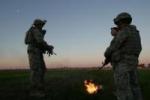Leslie Gelb has a very good one-pager about Robert McNamara in this week's Time. It gives a sharp treatise on the difficulties of McNamara's approach. I highlight because the last paragraph is of contemporary relevance in linking Vietnam to Afghanistan:
"As long as we're there and willing to fight and die, we won't lose. But in the end, we can't win either unless we realize that it must be their war-a war for the South Vietnamese to fight for their freedom and a war for Afghans to fight for theirs. We can help, but it must be theirs."
Pertinent after the casualty toll this last week.
Full article at http://www.time.com/time/magazine/ar...909627,00.html








 ), but it does have some pretty serious implications. For example, the SOFA agreement with Iraq that led to the drawdown in troop commitments and the pulling out from the urban areas indicates, to me at least, that the GOI is being treated as if it were an independant, legitimate gov't. Good move.
), but it does have some pretty serious implications. For example, the SOFA agreement with Iraq that led to the drawdown in troop commitments and the pulling out from the urban areas indicates, to me at least, that the GOI is being treated as if it were an independant, legitimate gov't. Good move. ] to the occupation of Germany and Japan after WW II, but without offical surrenders). So, is it FID? COIN? "War"? What?
] to the occupation of Germany and Japan after WW II, but without offical surrenders). So, is it FID? COIN? "War"? What?
 ) so I'll offer the view that with military endeavours being an extension of politics, political undertakings also require ongoing military activities. The military 'job' may be the continuation or threat of future violence to keep the enemy at the negotiating table or to increase the position of strength from which a settlement may be reached. It may also be maintaining sufficient forces and capabilities as deterrance to ensure the gains won.
) so I'll offer the view that with military endeavours being an extension of politics, political undertakings also require ongoing military activities. The military 'job' may be the continuation or threat of future violence to keep the enemy at the negotiating table or to increase the position of strength from which a settlement may be reached. It may also be maintaining sufficient forces and capabilities as deterrance to ensure the gains won.





Bookmarks